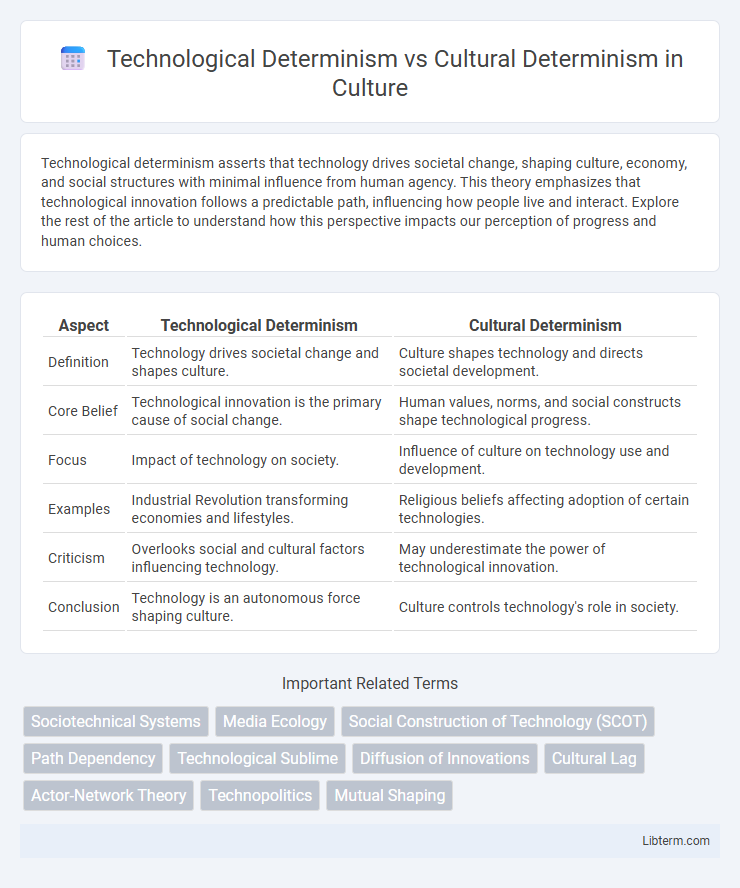Technological determinism asserts that technology drives societal change, shaping culture, economy, and social structures with minimal influence from human agency. This theory emphasizes that technological innovation follows a predictable path, influencing how people live and interact. Explore the rest of the article to understand how this perspective impacts our perception of progress and human choices.
Table of Comparison
| Aspect | Technological Determinism | Cultural Determinism |
|---|---|---|
| Definition | Technology drives societal change and shapes culture. | Culture shapes technology and directs societal development. |
| Core Belief | Technological innovation is the primary cause of social change. | Human values, norms, and social constructs shape technological progress. |
| Focus | Impact of technology on society. | Influence of culture on technology use and development. |
| Examples | Industrial Revolution transforming economies and lifestyles. | Religious beliefs affecting adoption of certain technologies. |
| Criticism | Overlooks social and cultural factors influencing technology. | May underestimate the power of technological innovation. |
| Conclusion | Technology is an autonomous force shaping culture. | Culture controls technology's role in society. |
Introduction to Determinism in Technology and Culture
Technological determinism asserts that technological innovation drives societal changes and shapes cultural values, positioning technology as the central force influencing human behavior and social structures. In contrast, cultural determinism emphasizes that cultural beliefs, values, and social norms fundamentally guide the development and adoption of technology, framing technology as a product of cultural context. Understanding these contrasting perspectives reveals the dynamic interplay between technology and culture in shaping societal evolution.
Defining Technological Determinism
Technological determinism is the theory that technology development drives social and cultural change independently of human influence. It posits that technological innovation shapes society's structure, values, and behaviors by introducing new tools and systems that redefine interaction and productivity. Key proponents like Marshall McLuhan argue that media technologies inherently alter human perception and social organization, emphasizing technology's autonomous power in shaping history.
Key Concepts of Cultural Determinism
Cultural Determinism emphasizes that societal values, beliefs, and traditions fundamentally shape technological development and adoption. It asserts that human choices and cultural contexts direct technological innovations rather than technology itself driving social change. Key concepts include the primacy of cultural norms, the influence of social institutions, and the interpretive role of human agency in shaping technological impacts.
Historical Evolution of Both Theories
Technological determinism originated in the early 20th century with theorists like Thorstein Veblen and later gained prominence through Marshall McLuhan's work on media influence, emphasizing technology as the primary driver of societal change. Cultural determinism emerged as a response during the mid-20th century, notably advanced by anthropologists such as Clifford Geertz, asserting that cultural values and social practices shape technological development and utilization. The historical evolution of these theories reflects a complex dialogue between technology's autonomous role and the interpretive power of cultural context within social transformations.
Major Proponents and Critics
Technological determinism, championed by theorists like Marshall McLuhan and Jacques Ellul, argues that technology shapes societal structure and cultural values, while cultural determinism, supported by Clifford Geertz and Raymond Williams, asserts that culture influences technological development and usage. Critics of technological determinism, including Langdon Winner, caution against overlooking human agency and cultural context in technological adoption, whereas cultural determinism faces critique from scholars who emphasize the autonomous impact of technology on social change. The ongoing debate highlights the complex interplay between technological innovation and cultural frameworks, revealing that both forces mutually inform societal evolution.
Real-World Examples: Technology Shaping Society
The rise of the internet exemplifies technological determinism by transforming global communication, commerce, and social interaction through digital connectivity. In contrast, cultural determinism is highlighted by the adoption and adaptation of social media platforms like TikTok, where cultural trends and user behaviors shape the technology's impact and evolution. These examples demonstrate how technology can drive societal change while societal values and practices concurrently influence technological development.
Instances Where Culture Drives Technological Adoption
Cultural norms and values significantly influence the adoption and adaptation of technology, as seen in Japan's integration of robotics in elder care, aligning with societal respect for aging. In India, mobile payment systems like Paytm rapidly expanded due to cultural preferences for cashless, community-oriented transactions. These examples illustrate how cultural frameworks can shape technological acceptance and utilization beyond mere technological capabilities.
Points of Convergence and Divergence
Technological determinism asserts that technology shapes society's structure and cultural values, whereas cultural determinism emphasizes human beliefs and practices as primary drivers of technological development. Both perspectives acknowledge a reciprocal relationship where technology influences cultural norms and culture guides technological innovation, highlighting points of convergence. Divergence lies in the emphasis: technological determinism prioritizes the autonomous impact of technology on social change, while cultural determinism focuses on human agency and cultural context shaping technology's adoption and evolution.
Contemporary Debates and Implications
Contemporary debates on Technological Determinism versus Cultural Determinism emphasize how technology shapes societal changes and how cultural contexts influence technological adoption and innovation. Scholars analyze the implications for policy-making, highlighting the dynamic interplay where neither technology nor culture solely dictates social outcomes but rather co-evolve in complex feedback loops. Understanding this dialectic informs approaches in digital governance, ethical AI deployment, and global communication strategies.
Future Perspectives on Technology-Culture Interaction
Future perspectives on technology-culture interaction emphasize a dynamic co-evolution where technological innovations shape cultural norms while cultural values simultaneously influence technological development. Emerging trends highlight the significance of user-driven design and ethical considerations in guiding artificial intelligence, augmented reality, and biotechnology integration. This interplay challenges deterministic views by underscoring reciprocal influence, promoting adaptive governance frameworks that balance technological potential with social implications.
Technological Determinism Infographic

 libterm.com
libterm.com